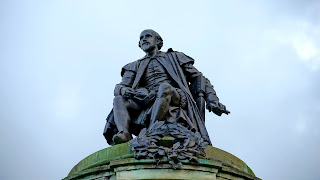The Elizabethan era is the epoch in the Tudor period of the history of England during the reign of Queen Elizabeth I (1558-1603). Historians often depict it as the golden age in English history. The symbol of Britannia (a female personification of Great Britain) was first used in 1572, and often thereafter, to mark the Elizabethan age as a renaissance that inspired national pride through classical ideals, international expansion and naval triumph över Spain,
Reformation, and the religious battles between Protestants and Catholics prior to Elizabeth's reign, and then the later conflict of the English Civil War and the ongoing political battles between parliament and the monarchy that engulfed the remainder of the seventeenth century. The Protestant/Catholic divide was settled, for a time, by the Elizabethan Religious Settlement, and parliament was not yet strong enough to challenge royal absolutism.
England was also well-off compared to the other nations of Europe. The Italian Renaissance had come to an end following the end of the Italian Wars, which left the Italian Peninsula impoverished. The Kingdom of France was embroiled in the French Wars of Religion (1562 1598). They were (temporarily) settled in 1598 by a policy of tolerating Protestantism with the Edict of Nantes. In part because of this, but also because the English had been expelled from their last outposts on the continent by Spain's tercios, the centuries-long Anglo-French Wars Were largely suspended for most of Elizabeth's reign.
 |
| Elizabethan era |
The one great rival was Habsburg Spain, with whom England clashed both in Europe and the Americas in skirmishes that exploded into the Anglo-Spanish War of 1585–1604. An attempt by Philip ll of Spain to invade England with the Spanish Armada in 1588 was famously defeated, but in turn, England launched an equally unsuccessful expedition to Spain with the Drake-Norris Expedition of 1589. The war carried on until the signing of the Treaty of London the year following Elizabeth's death.
England during this period had a centralised, well-organised, and effective government, largely a result of the reforms of Henry VII and Henry VIII, as well as Elizabeth's harsh punishments for any dissenters. Economically, the country began to benefit greatly from the new era of trans-Atlantic trade and persistent theft of Spanish and Portuguese treasures, most notably as a result of Francis Drake's circumnavigation
The term Elizabethan era was already well-established in English and British historical consciousness, long before the accession of the current Queen Elizabeth Il, and it remains solely applied to the time of the earlier Queen of this name.
Milian Cecil presiding over the Court of Ward's
Elizabethan England was not particularly successful in a military sense during the period, but it avoided major defeats and built up a powerful navy. On balance, it can be said that Elizabeth provided the country with a long period of general if not total peace and generally increased prosperity due in large part to stealing from Spanish treasure ships, raiding
with low defences, and selling African slaves. Having inherited a virtually bankrupt state from previous reigns, her frugal policies restored fiscal responsibility. Her
and cleared the regime of debt by 1574, and ten years later the Crown enjoyed a surplus of £300,000.- Economically. Sir Thomas Gresham's founding of the Royal Exchange (1565), the first stock exchange in England and one of the earliest in Europe, proved to be a development of the first importance, for the economic development of England and soon for the world as a whole. With taxes lower than other European countries of the period, the economy expanded, though the wealth was distributed with wild unevenness, there was clearly more wealth to go around at the end of Elizabeth's reign than at the beginning. This general peace and prosperity allowed the attractive developments that "Golden Age" advocates have stressed.
The Elizabethan Age Plots, intrigues and conspiracies
The Elizabethan Age was also an age of plots and conspiracies, frequently political in nature, and often involving the highest levels of Elizabethan society. High officials in Madrid, Paris and Rome sought to kill Elizabeth, a Protestant, and replace her with Mary, Queen of Scots, a Catholic. That would be a prelude to the religious recovery of England for Catholicism. In
1570, the Ridolfi plot was thwarted. In 1584, the Throckmorton Plot was discovered, after Francis Throckmorton confessed his involvement in a plot to overthrow the Queen and restore the Catholic Church in England. Another major conspiracy was the Babington Plot - the event which most directly led to Mary's execution, the discovery of which involved a double agent, Gilbert Gifford, acting under the direction of Francis Walsingham, the Queen's highly effective spymaster.
